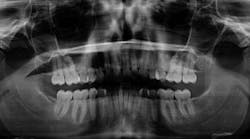A 23-YEAR-OLD FEMALE recently came in for a new-patient exam. Protocol for new patients includes the barrage of paperwork, signatures, blood pressure screenings, and, yes, radiographs (surprise!). Well, this young lady told my assistant she didn’t want x-rays. She said she was only here for a “cleaning,” but my front desk had informed her that she had to get established as a new patient first.
Well, yes, that’s normal, as assessing oral health and proper treatment planning (perio issues included) are part of what we as dentists/oral health-care providers do. It’s our JOB! According to the patient, her previous dentist—whom she hadn’t seen in two years—told her their practice didn’t take radiographs, citing “they weren’t allowed” to take them. When those words are some of the first ones out of a new patient’s mouth, the stage has already been set, and you can anticipate a situation that has the potential to be unpleasant and awkward.
I walked into the treatment room, introduced myself, sat in a chair so I was eye level (to be less intimidating), and asked the patient to explain the reasons why she didn’t want radiographs. Her answer was simple: radiation exposure. I proceeded to ask her the following questions:
- Do you understand the purpose of radiographs?
- If you have something wrong with your teeth, wouldn’t you want to know about it and get it fixed?
- Do you know that, as an established patient in my practice, the diagnosis of pathology resides in my hands, and by refusing to allow me to assess completely and fully, you are denying yourself the opportunity to receive any care or treatment?
- Did you know that with digital radiographs exposure is minimal and the benefits far outweigh the risks?
The woman’s answers validated that she cared about her self-wellness, which supported the fact that she was concerned about radiation exposure. She was absolutely set on the fact that the small amount of radiation she would receive from dental radiographs would do her harm. I get it. I totally get it, but she was misinformed and set in her belief. So, when I asked her if it was OK to proceed, she again refused.
I now had a conundrum on my hands. I could either succumb to her wishes and have a potential liability to worry about—to which she said she would never hold me accountable (famous last words)—or I could refuse to establish her as a patient in my practice. I informed her that I could not force her to take radiographs, but without compliance on her part, perhaps this doctor/patient relationship was not going to work. I suggested that she consider seeking care with someone else who could acquiesce to her demands.
She then said, “So, what you’re saying is if I don’t let you take radiographs, you won’t see me as a patient?”
I smiled and said, “Yes, you are correct. Your comprehensive care is in my hands, so I will leave you here for a few minutes to decide what you wish to do.”
I left the room and let her ruminate on it for a bit. Eventually, she decided to move forward with her dental care.
We’ve all had experiences like this, with patients saying they don’t want us to do certain dental procedures or use particular materials for one reason or another. But this has the potential to put us in a precarious situation because it doesn’t allow us to treat patients to our full capacity. Does this mean we are lacking in patient education, or is it something else? Dr. Google? A friend’s words/advice versus ours? Hello, social media.
I take pride in customizing my established patients’ care to fit their needs. Some of my patients require radiographs every six to 12 months due to their caries risk and lack of home care; others, I recommend they have radiographs every 24 months. Periodontal care is no different; some are on three-month, four-month, and even six-month frequencies. If their needs change, we adapt. Every patient is different, and as such, their needs and treatment must be flexible to reflect that which is in their best interests—without compromising our ability to see to these demands. Again, educating our patients is key.
As it turned out, this young woman was at a very low risk for caries, and we agreed upon a two-year interval for her established care. The question that begs answering is this: what if she wasn’t a low caries risk?
Many of you will have an opinion on the patient in my example, and some of you would have handled this situation differently. Some may say I bullied her. I don’t believe I did. I let her decide how she wanted to proceed after taking the opportunity to discuss pertinent facts with regard to her initial refusal. She ultimately decided what was in her best interest with the care that I would subsequently be able to provide.
What’s the takeaway with all this? We need to educate our patients and reassure them regarding our professional opinion on matters that can get skewed on the Internet and in social media forums. Furthermore, sometimes patient relationships don’t work out and that’s OK, but we need to stand our ground in all facets of dentistry, especially when we’re told, “I won’t hold you accountable for anything that goes wrong....”
Cheers, friends!
— Dr. Stacey








